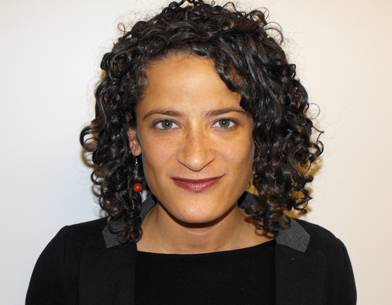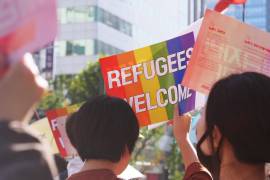
Ask Lambda Legal: LGBT People in Immigration Detention Facilities
Blog Search
Q: I have a cousin who was recently picked up by Immigration and Customs Enforcement (ICE), and she’s transgender. She is planning to apply for asylum in the United States because she is afraid she will be persecuted if she is deported. I heard that there are new rules to protect transgender people in immigration detention facilities. What are they?
A: This month, the Department of Homeland Security (DHS) at long last published the Prison Rape Elimination Act (PREA) regulations to prevent, detect and respond to sexual abuse and assault in DHS confinement facilities. Lambda Legal submitted comments on the DHS’s proposed regulations this past February, saying that LGBT people in custody are particularly vulnerable and are at heightened risk for sexual assault and physical abuse.
Many LGBT immigrants flee persecution as a result of their sexual orientation or gender identity, only to face sexual assault and harassment in immigration detention facilities in the United States. Transgender people, in particular, are at high risk for abuse. The Congressional Research Service reported that 20 percent of substantiated allegations of sexual abuse in these facilities involve transgender people.
The PREA protections adopted by the Department of Justice in 2012 did not extend to people in immigration detention facilities, despite the fact that they face the same issues as people in prisons, jails and lockups. In May 2012, the Obama administration addressed the omission and announced that the PREA regulations would apply to DHS immigration detention centers as well as DOJ facilities, a crucial decision.
While an important step forward, the new DHS standards are not perfect. They don’t prohibit retaliatory deportation of those who report abuse, and they apply to DHS contract facilities only when substantive contract modifications are negotiated, which may mean a delay of years. Moreover, the regulations entirely fail to address DHS’ abhorrent bed mandate, which ICE interprets as a requirement that it maintain and fill 34,000 beds daily.
While overall the regulations have fallen short of what LGBT advocates have asked, there are some good developments. The standards overall strive to reduce the prevalence of rape and sexual assault in immigration detention facilities. With respect to transgender detainees, they prohibit searches for the sole purpose of determining genital characteristics and prohibit housing assignments based solely on identity documents or physical anatomy, requiring facilities to consider transgender detainees’ self-identification of gender and self-assessment of safety.
Now it remains to be seen how the implementation process will unfold. For LGBT immigrants, it is crucial that the new adopted DHS regulations be implemented fully and quickly.
It is often said that a society can be measured by how it treats its most vulnerable members. LGBT detainees made invisible by the walls of an immigration detention facility are certainly among the most vulnerable.
If you feel you have been discriminated against because of your gender identity, sexual orientation, or HIV status, contact Lambda Legal’s Help Desk at 1-866-542-8336, or see http://lambdalegal.org/help




